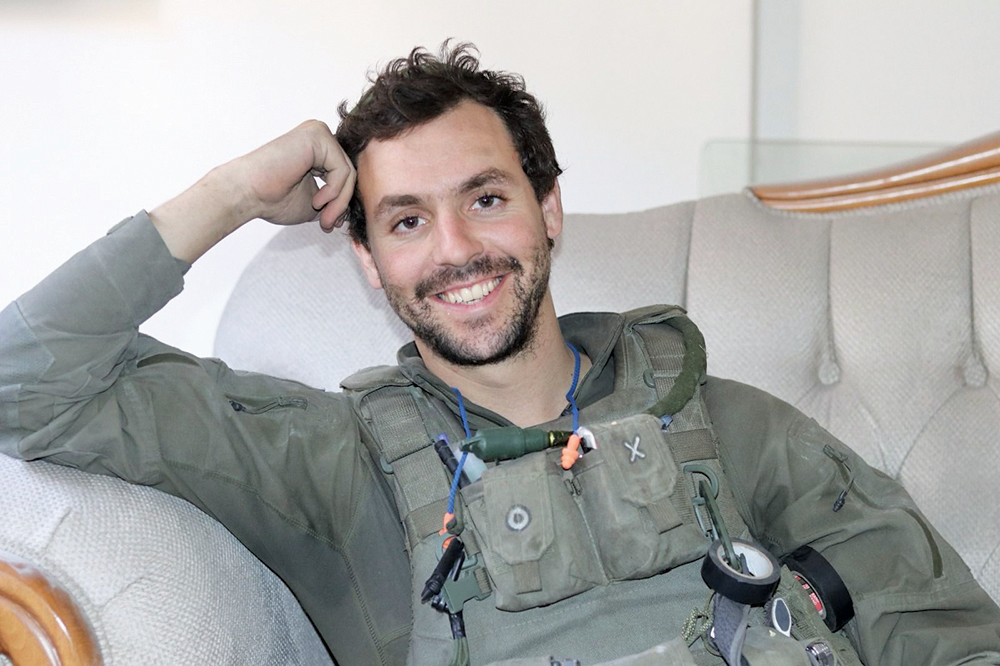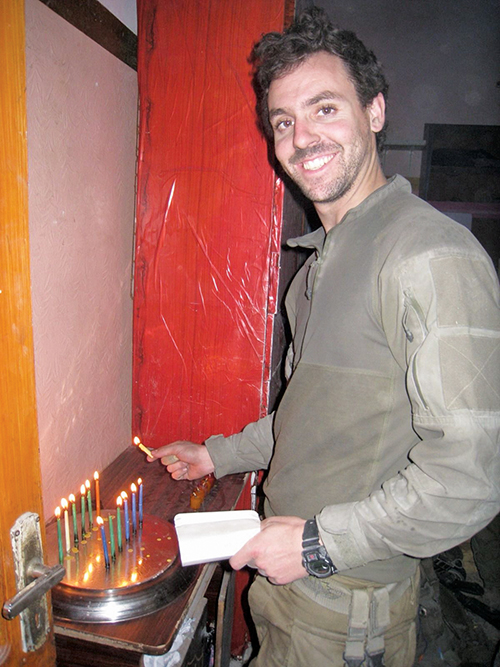
A thought on Parshat Bo from the words of David Schwartz, H”YD.
David fell in battle in Gaza this week. May his Torah live on through us.
This past week we lost a beautiful neshama in the war in Gaza, Sgt. First Class David Schwartz H”YD from Elazar. In the words of his grandmother Susie Gitler (Long time Teaneck resident), “David was the real deal,” a dream grandson who was sweet, kind, serious about his religious devotion, loving, and passionate about Am Yisrael and Eretz Yisrael. David, son of Sarah and Yair Schwartz, fell in battle Al Kiddush Hashem January 8, 2024 in Gaza just two days after celebrating his third anniversary to his amazing wife Meital, daughter of Joseph and Leelah Gitler (may Hashem, her family and Am Yisrael continue to comfort her, and the entire family).
While at the shiva visit something unusual happened, especially given that David was only 26 years old when he was taken from us. A sefer was given out entitled “LeDavid Barchi Nafshi” divrei Torah on the weekly portion. The author was David Schwartz H”YD and it was written by him to celebrate his marriage to Meital. David, in writing these divrei Torah felt that Torah cannot be read as a history book but that the thoughts and stories of the past had to be learned, owned and expounded upon to make it personal and relevant to each generation. As I opened the sefer to the coming weeks portion, his words jumped off the page and I felt that this had to be shared with everyone during this moment in history:
_______________________
In this week’s parsha, Parshat Bo, we read about the final three plagues and the ending of our time as slaves to Pharaoh in Egypt. With each of the first nine plagues Moshe and Aharon plead with Pharaoh to “let my people go” and each time Pharaoh’s stubbornness leads to the next plague. All this leads to the plague of the firstborn where we see a difference in God’s involvement in the carrying out of the plague, as we read
וְעָבַרְתִּ֣י בְאֶֽרֶץ־מִצְרַ֘יִם֮ בַּלַּ֣יְלָה הַזֶּה֒ וְהִכֵּיתִ֤י כׇל־בְּכוֹר֙ בְּאֶ֣רֶץ מִצְרַ֔יִם מֵאָדָ֖ם וְעַד־בְּהֵמָ֑ה וּבְכׇל־אֱלֹהֵ֥י מִצְרַ֛יִם אֶֽעֱשֶׂ֥ה שְׁפָטִ֖ים אֲנִ֥י ה›׃
For that night I will go through the land of Egypt and strike down every [male] first-born in the land of Egypt, both human and beast; and I will mete out punishments to all the gods of Egypt, I God.
Every Pesach as we sit at our Seder and we say,
וְעָבַרְתִּי בְאֶרֶץ מִצְרַיִם בַּלַּיְלָה הַזֶּה, אֲנִי וְלֹא מַלְאָךְ; וְהִכֵּיתִי כָל בְּכוֹר בְּאֶרֶץ־מִצְרַים, אֲנִי וְלֹא שָׂרָף; וּבְכָל־אֱלֹהֵי מִצְרַיִם אֶעֱשֶׂה שְׁפָטִים, אֲנִי וְלֹא הַשָּׁלִיחַ; אֲנִי ה›. אֲנִי הוּא וְלֹא אַחֵר.
And I will pass through the Land of Egypt” – I and not an angel. “And I will smite every firstborn” – I and not a seraph. “And with all the gods of Egypt, I will make judgments” – I and not a messenger. “I am the Lord” – I am He and there is no other.
The question asked is why God takes this plague so personally that it had to be God and not a surrogate, what was it about this final plague that it had to be carried out by God and not Moshe or an angel? Furthermore, with all the other plagues the children of Israel were passive and God brought the plagues on the Egyptians while saving the Jews. For example we see that in the plague where God brings an epidemic on the animals of the Egyptians (dever),

וְהִפְלָ֣ה ה› בֵּ֚ין מִקְנֵ֣ה יִשְׂרָאֵ֔ל וּבֵ֖ין מִקְנֵ֣ה מִצְרָ֑יִם וְלֹ֥א יָמ֛וּת מִכׇּל־לִבְנֵ֥י יִשְׂרָאֵ֖ל דָּבָֽר׃
But God will make a distinction between the livestock of Israel and the livestock of the Egyptians, so that nothing shall die of all that belongs to the Israelites.
No need for the Jews to do anything for this plague, but for the plague of the firstborn they had to slaughter a sheep and paint their lintel and doorposts with the blood, so that when the plague struck at midnight God could separate between the Jewish homes and the Egyptian homes. Why was this needed?
David quotes the Netivot Shalom who says there are two aspects of the 10 plagues. The first is the physical aspect of extracting the Jewish people from the land of Egypt. The second is the choosing of the children of Israel to be his special people. The plague of the first born carried out both aspects. This plague was the culmination of all the other plagues in bringing about the release of the Jewish people from slavery. But the deeper purpose of this plague was to choose the Jewish people as a separate and treasured nation.
With this plague, God chose the Jewish people as his nation, he took them from the 49th level of tumah (impurity) and fulfilled the covenant that he made with the forefathers (Bereishit 15:13-14)
וַיֹּ֣אמֶר לְאַבְרָ֗ם יָדֹ֨עַ תֵּדַ֜ע כִּי־גֵ֣ר ׀ יִהְיֶ֣ה זַרְעֲךָ֗ בְּאֶ֙רֶץ֙ לֹ֣א לָהֶ֔ם וַעֲבָד֖וּם וְעִנּ֣וּ אֹתָ֑ם אַרְבַּ֥ע מֵא֖וֹת שָׁנָֽה׃
And [God] said to Abram, “Know well that your offspring shall be strangers in a land not theirs, and they shall be enslaved and oppressed 400 years;
וְגַ֧ם אֶת־הַגּ֛וֹי אֲשֶׁ֥ר יַעֲבֹ֖דוּ דָּ֣ן אָנֹ֑כִי וְאַחֲרֵי־כֵ֥ן יֵצְא֖וּ בִּרְכֻ֥שׁ גָּדֽוֹל׃
but I will execute judgment on the nation they shall serve, and in the end they shall go free with great wealth.
The deep message that God is telling us is that in fulfilling the covenant that he made with Abraham, that could not be done through a messenger. Unlike all the other plagues, this covenant required God himself in his complete glory to come down to this world to fulfill his word.
But that does not explain why in this plague, specifically, it required the Jews to physically mark their homes—especially if it was God himself doing this miracle. The essence, he explains, is that the marking of the house was not needed for the purpose of carrying out the plague, for none of the other plagues required such a symbolic act, but rather the action taken by the Jews was to show their choice as the Jewish nation. It was needed to parse out who was a Jew, who was fit to be a part of the nation. A Jew who wants to be a part of the people has to do his part, to take action. God doesn’t need our help, our marking on a doorpost. The mark was for the people themselves to make a choice and be participants with God. During the Exodus from Egypt the Jews had to make a conscious decision to partner with God to bring about the redemption. A Jew who wants to be a part of the redemption has to do something to prove it.
The mitzvah of milah and the mitzvah of Pesach are everlasting symbols of the link and covenant between God and Bnei Yisrael. The rabbis explain that it is the merit of the blood of milah and the Paschal offering that the Jews were redeemed from Egypt. Because of these two mitzvot we were chosen to be God’s nation. Accordingly, who is a Jew? The person who has a burning passion to be a part of this special people.
David ends the thought by saying, the great teaching is that in order to be a partner within the nation of God it is not good enough to coast by and do the mitzvot like a servant fulfilling the desires of his master. Rather we have to be active participants in our destiny, to live life to its fullest so that we can each maximize our potential. If we can live life this way, fulfilling Torah and mitzvot while advancing and improving this world, then we are living up to our calling of being a kingdom of priests and a holy nation.
________________________
David made the ultimate sacrifice in the defense of Am Yisrael. He not only learned but internalized the Torah he learned and acted on his principles. He lived and died fulfilling his part of that covenant made between Hashem and Abraham. Just as the blood of milah and the Korban Pesach are said to have merited our exodus from Egypt, let us pray that the blood of David, all our chayalim and all those lost since October 7, bring the ultimate redemption speedily in our times.
Dr. Mark Levie lives in Teaneck with his wife Dena and their family.













